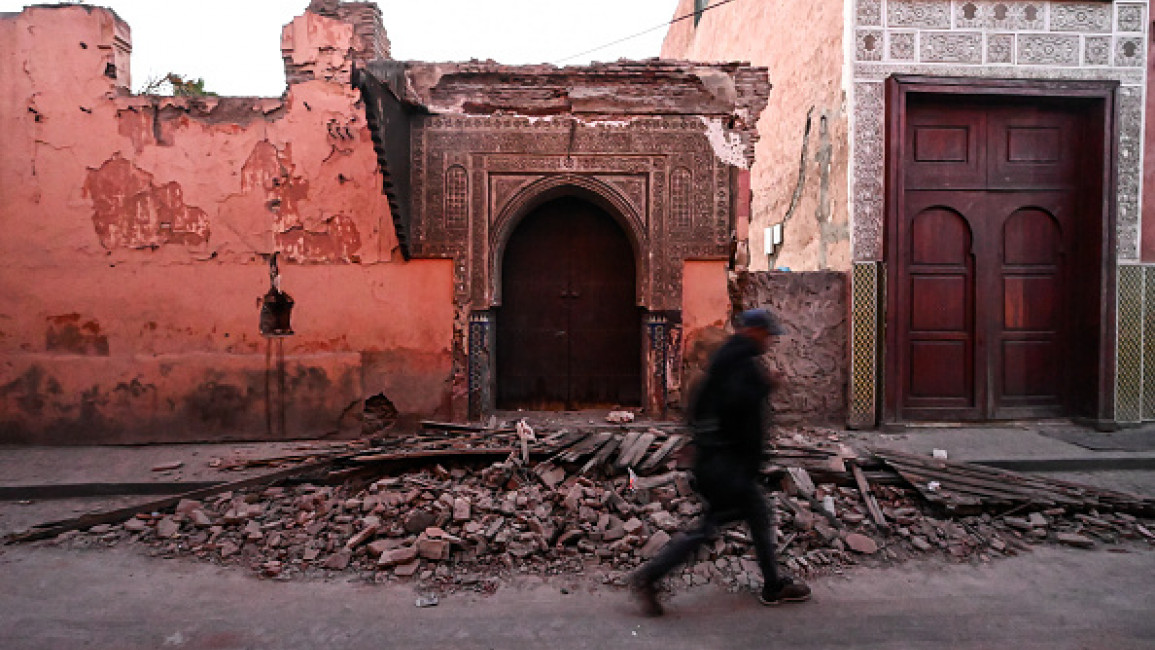Marrakech prepares for IMF, World Bank meetings one month after deadly quake
Moroccans living just an hour from where the global financial elite will gather for IMF and World Bank meetings next week are homeless and destitute after last month's deadly earthquake, camping amid the rubble of their devastated villages.
Near the conference venue in the city of Marrakech, where quake damage was less severe, the old city wall has already been repaired, a fallen minaret has been covered up, rubble has been removed, lawns trimmed and flowers planted.
But in the High Atlas mountains where most of the quake's 3,000 victims were killed, villagers live in tents with little access to showers or working toilets, surviving on state handouts while they try to resurrect their shattered lives.
The vivid contrast reflects inequalities that already defined a country that has some of Africa's most advanced infrastructure and industry, but where many of the rural poor live without basic services including sewage systems.
A single night in a twin bedroom at Marrakech's historic La Mamounia hotel during the IMF meeting was advertised this week at 20,000 Moroccan dirhams ($1,900). Average annual GDP per capita among people living in this region is only about $2,000.
When the quake struck remote Imi N'Tala "it was like a bomb" said Omar Ait Ougadir, who lost his two sons Khaled, 14, and Taoufiq, 10, in the disaster, among a total of 84 killed in their village. Ait Ougadir's wife and daughter survived.
"I don't know what we'll do when it snows," he lamented, as he collected wood from fallen houses to build a hut next to the yellow tent among the trees outside the village where they swelter by day and freeze at night.
Most houses in Imi N'Tala were either destroyed or badly damaged, with a landslide blocking the only road for a week. The villagers must share four toilet cubicles that were still unconnected to the water supply when Reuters visited this week.
Authorities have promised compensation for quake victims including a monthly stipend of $250 per household and thousands of dollars to rebuild fallen homes. They have distributed tents and blankets, set up field hospitals and are removing rubble.
The government plans to invest $12 billion in reconstruction and infrastructure over five years in the quake-ravaged region. The IMF last week approved a $1.32 billion loan, requested before the quake, to guard against climate-related disasters.
Tourism return
More than 10,000 people are expected to attend the IMF and World Bank meeting at the direct request of Morocco's government, and fund spokesperson Julie Kozack said Rabat had given assurances the conference would not disrupt relief work.
The annual meeting had been scheduled to take place in Marrakech since long before the earthquake and is expected to address global issues including debt relief for poorer countries and economic fallout from friction between the US and China.
The meeting is now seen as important for drawing back tourists to Morocco, supporting a sector that is crucial for picturesque Marrakech and the surrounding areas that were hit by the quake.
At the city's famous Jemaa al-Fna square, where locals and tourists crowd past street entertainers and market stalls, juice maker Hamid Ben Addi said he hoped the meetings would help bring back visitors.
"Business was a bit sluggish but now thank God normal life is gradually resuming," he said.
About 50 kilometres (31 miles) south of Marrakech, normal life is also gradually returning to the town of Amizmiz, with cafes and restaurants serving customers in damaged buildings although debris still sometimes falls from roofs and ceilings.
Issam Mazgouti lives in one of the hundreds of tents dotted around the town with his wife and six children after their home collapsed.
He said the biggest problem that quake survivors currently face is sanitation - a problem also voiced by Ait Ougadir in the village of Imi N'Tala, who said he had only been able to shower once since the earthquake.
Mazgouti said his family was one of about 100 households that had to share two toilet cabins and a single tap of water.
"Men go outside, leaving the two toilets for the women, who have to suffer very long queues day and night," he said.
(Reuters)



